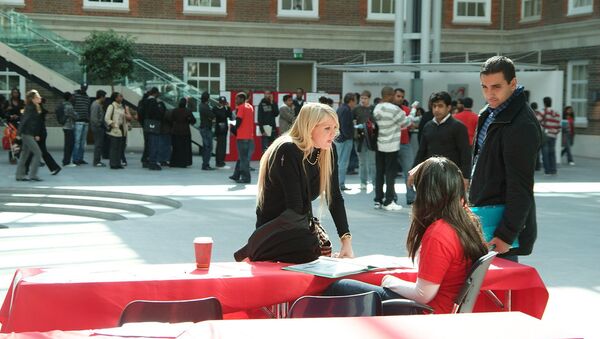Michael Cottakis, 25, is president of the 1989 Generation Initiative at the European Institute, LSE, which is a group that seeks to reinvigorate the European Project with new policy proposals, developed through discussion between young Europeans and experts.
Mr Cottakis, believes that Brexit will impact students in the UK negatively.
"If we were to Brexit a huge number of jobs supported by the EU [would be under threat] and students would have less access to EU start-ups and project funds," Michael Cottakis told Sputnik.
The issue of whether the UK will have access to the single market is also a huge concern among the student body, which is pushing many to consider studying abroad as they believe there will be less access to it.
Mr Cottakis said that if the UK does decides to leave the EU, the biggest threat to students will be the demise of the Erasmus program, a student exchange initiative that gives both UK and EU students the opportunity to travel abroad and study.
"The Erasmus program is a great opportunity and allows students to travel, but such opportunities will become more limited if the UK leaves the EU," Michael Cottakis told Sputnik.
Barbara Aubin, head of a team at the 1989 Generation Initiative at LSE, believes that students will be at a greater disadvantage if the UK leaves the EU and has already spoken to fellow European and international students who are considering going to Canada and the US to study.
"I'm a recent graduate and I spoke to my friend and we are all very worried about Brexit, as it will mean that EU students will pay the same as international students which can be double. We came to the UK with the prospect of getting a job and I think that many EU students will rethink whether they should come here. It will be a less attractive business proposition," Ms Aubin told Sputnik.
However, there are those students who are on the fence, unsure what the best option would be for the UK and the EU. Some international students in the UK are unable to decide whether to vote leave or remain.
Pijus Simonaitis from Lithuania, is on a Computer Science internship at Edinburgh University, and is very confused when it comes to the referendum. He understands the dilemma and says that some voters may opt for "Remain" when it comes to voting on the Thursday, 23 June 2016.
"I'm a European citizen and I profit from Britain being in the EU. I'm considering doing my PhD here so from the academic point of view it's very convenient for me being in the EU. But when you consider the arguments for leaving, it's natural because Great Britain has always opposed France and Germany in the EU.
"The understanding of the EU is different in Britain and on the continent. In France and Germany you feel that communal, continental identity — and we as Lithuanians feel this as well — whereas in Britain, it is more related to the economic aspects. So for the EU itself, it may better if Britain decides to leave and follows its own course and then we will feel more consolidated ourselves. But then the fear of the EU breaking up as a result is great as well, so I'm really confused," Mr Simonaitis told Sputnik.



